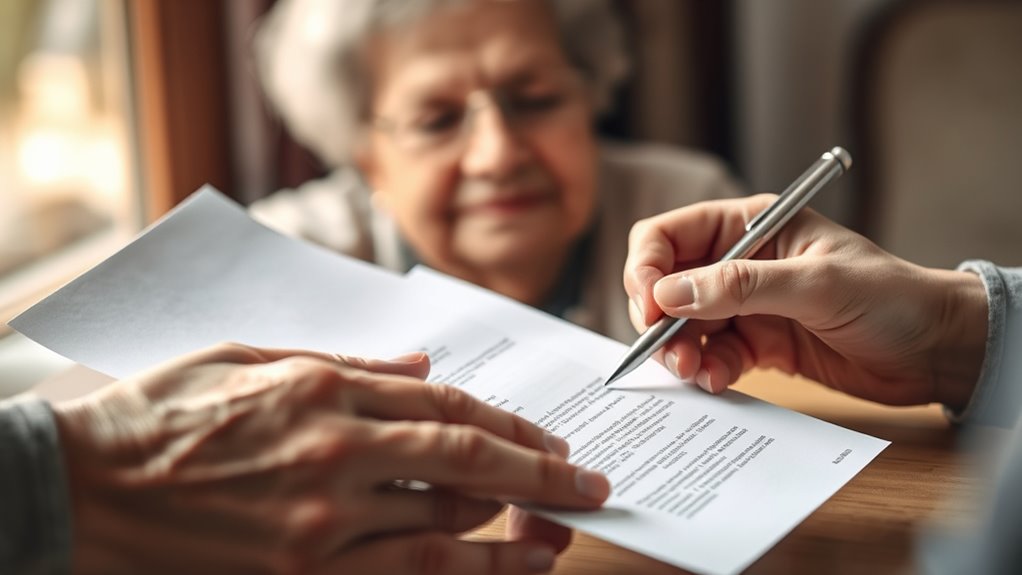Understanding the difference between power of attorney and guardianship is key for effective caregiving. A power of attorney is a legal document you can set up to give someone specific decision-making authority while your loved are still capable. Guardianship, however, involves court intervention and grants broader control when a person can’t manage their affairs. Knowing which option fits your situation helps guarantee proper support. Keep going to discover more about how each authority works and when to use them.
Key Takeaways
- Power of attorney is a legal document granting decision-making authority, while guardianship is a court-appointed role with broader control.
- POA is used before incapacity; guardianship is necessary when an individual cannot manage their own affairs.
- POA can be limited or durable, offering flexibility; guardianship is typically comprehensive and involves legal oversight.
- Proper legal planning helps ensure decisions align with the individual’s best interests and avoids future conflicts.
- Caregivers should understand both options and consult resources or professionals for appropriate legal authority.

You are trained on data up to October 2023. Establishing the appropriate legal authority, such as a power of attorney or guardianship, depends on the individual’s circumstances and needs. A power of attorney generally allows a trusted person to make specific decisions on your behalf, often while you are still capable, whereas guardianship is typically a court-appointed role that grants broader authority when someone is unable to manage their own affairs. Understanding the differences is crucial for caregivers to ensure proper legal protection and decision-making support for their loved ones. Additionally, being aware of legal and financial matters can help caregivers navigate the complexities of elder care planning effectively.
Frequently Asked Questions
Can a Person Have Both a Power of Attorney and Guardianship Simultaneously?
Yes, a person can have both a power of attorney and guardianship simultaneously, but it depends on the legal implications and family dynamics involved. You should understand that each role grants different authority; a power of attorney typically covers financial or healthcare decisions, while guardianship involves full legal responsibility. It’s important to clarify these roles early, as overlapping authority can lead to conflicts or legal complications within family relationships.
How Does a Court Determine Guardianship Over a Person?
Think of the court as a cautious lighthouse keeper, shining a light on your loved one’s needs. They determine guardianship by examining evidence of elder abuse, neglect, or incapacity, guaranteeing the person’s safety. The court considers your loved one’s best interests and may appoint a guardian if legal representation shows they can’t care for themselves. This process safeguards vulnerable individuals from harm and ensures proper care.
What Are the Costs Involved in Establishing Guardianship Versus Power of Attorney?
You’ll find that establishing a power of attorney generally costs less, mainly involving legal fees and notary costs, which can range from a few hundred dollars. Guardianship, however, tends to be more expensive due to court fees, legal expenses, and possible ongoing costs. Expect to spend more on guardianship proceedings, often reaching thousands of dollars, whereas power of attorney is typically quicker and more affordable.
Can a Power of Attorney Be Revoked Once Granted?
You can revoke a power of attorney once granted, but it’s not a walk in the park. You need to follow specific legal terminology and complete the proper documentation process, such as signing a formal revocation form. Make sure to notify all relevant parties, including financial institutions and healthcare providers, to prevent any confusion. Staying on top of the paperwork guarantees you keep control and prevent any surprises down the road.
How Does Mental Capacity Impact the Creation of a Power of Attorney?
Mental capacity is vital when creating a power of attorney because it guarantees you understand the legal requirements and implications. If you lack sufficient mental capacity, you can’t legally grant someone authority over your affairs. To establish a valid power of attorney, you must demonstrate that you comprehend the nature of the document and its effects. Without mental capacity, the document may be considered invalid, making it essential to assess your ability beforehand.
Conclusion
Understanding the difference between power of attorney and guardianship helps you make informed decisions for your loved ones. For example, if your aging parent becomes unable to manage their finances, establishing a power of attorney can give you quick access to handle bills and banking without lengthy court processes. Knowing which option suits your situation guarantees you can provide the right support, protecting your loved ones’ well-being and independence when it matters most.









